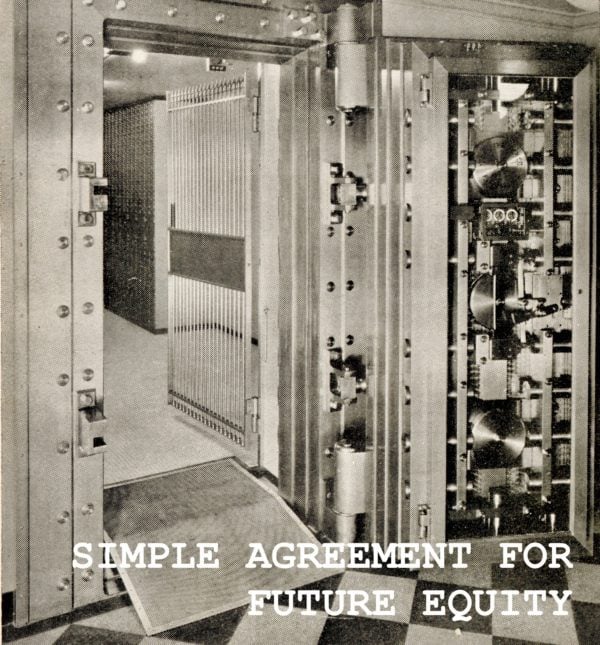
Not too long ago the SEC came out with an Investor Bulletin, emanating from the Office of Investor Education and Advocacy, regarding the utilization of SAFEs as an investment vehicle on crowdfunding platforms. The SEC stated;
“Some issuers have been offering a new type of security as part of some crowdfunding offerings—which they have called the SAFE. A SAFE is very different from traditional common stock and it is important to understand these differences in order to make an informed investment decision that is right for you.”
 The SEC states that SAFEs “were designed to best operate in the context of a fast growing startup likely to need and attract additional capital from sophisticated venture capital investors. This may or may not be the case with the crowdfunding investment opportunity you are exploring.” The Bulletin says there is nothing standard or simple about a SAFE.
The SEC states that SAFEs “were designed to best operate in the context of a fast growing startup likely to need and attract additional capital from sophisticated venture capital investors. This may or may not be the case with the crowdfunding investment opportunity you are exploring.” The Bulletin says there is nothing standard or simple about a SAFE.
SEC Commissioner Piwowar warned consumers about the utilization of SAFEs in a speech this past May. Piwowar stated;
“In contrast to the sophisticated venture capital investors for whom SAFEs were originally intended, Regulation Crowdfunding [Reg CF] is designed to serve as a new method of raising capital from a broad, mostly retail base of investors … Intermediaries face a real challenge in educating potential investors about this high-risk, complex, and non-standard security when the security itself is entitled “SAFE.” Companies and their intermediaries should think carefully about how they name or describe their securities. Securities marketed as “safe” or “simple” ought to be just that.”
 The utilization of SAFEs or “Simple Agreement for Future Equity” has become commonplace on crowdfunding platforms in lieu of equity, debt or convertibles. SAFEs were concocted by Y Combinator several years ago and are widely utilized for early stage companies. SAFEs are more like warrants that give the individual an option to purchase shares in the future at a discount. Kind of like convertible debt without the debt.
The utilization of SAFEs or “Simple Agreement for Future Equity” has become commonplace on crowdfunding platforms in lieu of equity, debt or convertibles. SAFEs were concocted by Y Combinator several years ago and are widely utilized for early stage companies. SAFEs are more like warrants that give the individual an option to purchase shares in the future at a discount. Kind of like convertible debt without the debt.
So if SAFEs are so undesirable why are they used and why would you invest in them?
First of all, investing in any early stage business is a risky endeavor. Many, if not most, of these companies will fail or struggle to gain traction and generate a return for early investors. Each individual investor must balance their ability to tolerate risk and potential for loss alongside their expectations for any given security. If you are risk averse, investing in startups is no place for you. And we totally agree with the SEC that investors must understand the security and the risk affiliated with early stage investing.
But SAFEs are quite convenient for smaller firms. The documents are simple to complete and there may be no looming trigger date that creates a race against time where a debt payment is due. Additionally, an issuer of SAFEs does not have to manage equity holders who actually own a stake in the firm. If you really want a company to grow you don’t necessarily want management spending all of their time communicating with shareholders – one at a time. You want them executing on their business vision.
[clickToTweet tweet=”If you are buying equity in an early stage company is it really that much better than a SAFE? #Crowdfunding” quote=”If you are buying equity in an early stage company is it really that much better than a SAFE? #Crowdfunding”]
And if you are buying equity in an early stage company is it really that much better than a SAFE?
 We contacted Georgia Quinn, a Crowdfund Insider Senior Contributor. Quinn is also a securities attorney at Ellenoff, Grossman & Schole and is the co-founder of iDisclose – a Regtech startup in the crowdfunding space. Quinn shared here opinion on SAFEs and the SEC’s characterization of the security;
We contacted Georgia Quinn, a Crowdfund Insider Senior Contributor. Quinn is also a securities attorney at Ellenoff, Grossman & Schole and is the co-founder of iDisclose – a Regtech startup in the crowdfunding space. Quinn shared here opinion on SAFEs and the SEC’s characterization of the security;
“I take issue with the SEC’s characterization that the Crowd Safe is “not simple.” Compared to what, I ask,” said Quinn. “Convertible notes, a popular startup financing instrument are certainly as, if not more, complicated (and frankly almost identical to most Crowd Safes). I understand that they may not be as “simple” as common stock from a mechanics perspective, but putting on a valuation on the common stock of a non publicly traded start up is not only quite complicated but virtually impossible. In fact the only thing you know about the valuation of a start up, is that it is wrong.”
Digging deeper into the theory behind equity and the rights of a shareholder, Quinn explained that SAFEs may be safer than the SEC thinks;
“Furthermore, I don’t find common stock to provide any tangible “protections” that are being touted such as fiduciary duties, etcetera. The right to vote is irrelevant since the crowdfunding holders own such a small percentage, the information rights are negligible and less than those required by Reg CF itself. If a company CEO takes the money to Vegas, it won’t be a fiduciary duty claim that will be brought, but securities fraud which can be charged by a Crowd Safe holder the same as a common stock holder. And finally, many Crowd Safes have a liquidation feature upon bankruptcy which converts them to a general unsecured contract claim rather than a residual common stock holder and thus makes them structurally senior to the common stock holders of the company. All of this is a long winded way of saying the concerns about Crowd Safes is much ado about the wrong thing. If a person is going to defraud investors the type of security they issue will have little impact, and if a company simply goes out of business all security holders (common, preferred, and Crowd Safe) will likely get the same thing – nothing.”
This is certainly food for thought. One of the early challenges for equity crowdfunding is creating a reasonable valuation of an early stage firm. There have been more than a few investment crowdfunding offers where the valuation was absolutely outlandish. Perhaps best described as ridiculous. Even if the company gets traction, future funding rounds may be downrounds, diluting early shareholders creating the potential for shares that are worth little to nothing. Wouldn’t it be better to wait until a professional investor like a VC or Angel establishes a more realistic valuation for a fast growing firm?
 Now it is true that not all crowdfunding companies should consider using SAFEs. Firms that can scale may be better candidates for these types of offerings. In fact, one crowdfunding platform NextSeed is a debt only Reg CF portal. NextSeed has skipped over this discussion in its entirety.
Now it is true that not all crowdfunding companies should consider using SAFEs. Firms that can scale may be better candidates for these types of offerings. In fact, one crowdfunding platform NextSeed is a debt only Reg CF portal. NextSeed has skipped over this discussion in its entirety.
Amy Wan, another Crowdfund Insider Senior Contributor who is also a securities attorney and engaged with her own Fintech startup, explained;
“A few commentators seem to be vilifying the SAFE. The SAFE is not inherently evil, nor is any other security instrument for that matter. The SAFE instrument is merely a tool. In some cases, when used appropriately, its a tool that makes a lot of sense; in other cases, it may make no sense at all. Don’t hate on the tool. Hate on those who aren’t using it appropriately.”

